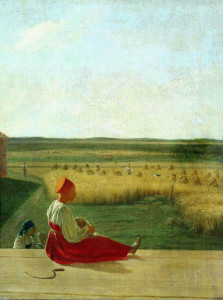The aim of the project was to investigate modern economical discourse in Russia in connection with the complex reception of the Aristotelian theory of oikonomia and the Christian history of salvation handed down from Orthodox ecclesiastical law. That concept puts an emphasis on positive, minor deviations for the sake of an overall purpose, an axiology accompanied by terminologically vague discourse.
Research
Against this background, research was conducted into two questions which thus far have hardly been examined: a) Economies of space and of cultural heterogeneity in an imperial context, and b) Poetics of Russian places of oikonomia. (The second question was addressed by Thomas Skowronek in his postdoc project).
Results of the project were presented on the conference “Von Administratio zur Gouvernementalität” (From Administratio to Gouvernementality) organized by members of the research group (B-3) Oikonomia. Further findings were included in the cumulative presentation of the group.
Results

Aleksej Venecianov “Bei der Ernte. Sommer” ca. 1825. (The State Tretyakov Gallery. Jubilee Album to mark the 850th anniversary of Moscow, Moskva 1997)
The main results confirmed the assumed interdependence between Aristotelian oikonomia and (early) modern economic discourse in Russia. Mostly without specifically mentioning antique sources, references to Aristotelian and comparable economic models provided a basis for political critique.
With a view to Russia’s economy in the modern age and its literary reflection by Gogol, for example, it is not only revealed how ethical, evidently substantive economic models are referred to, but also how an equally necessary and problematic (due to always remaining unfinished) recording practice of economic processes is treated in literature. His paradigmatic novel “Dead Souls” can read as a polemic against the state created by Peter I. The plot – the purchase of “dead souls” by the protagonist Pavel Ivanovič Čičikov – refers to an economic practice introduced by Peter I, which differs from the fiscal practice mentioned in the “Domostroj”. Censuses were conducted at intervals of several years to collect the figures, whereby the data recorded was kept in so-called “revizskie skazki” and remained valid until the subsequent census. This resulted in the emergence the phenomenon of the “dead souls”, i.e. those who died between two successive censuses but were still included on paper up to the next census. Gogol creates an image, in which the modern, secular state appears as the origin of morally pervertible types of economy (of an insatiable art of acquisition and its hypocritical practice), while only the sovereign landowner/paterfamilias can enjoy divine legitimacy in his economic practice. According to this thesis, the critique of modernity fictionally staged in the “Dead Souls” thus concerns not only the liberalism received in Russia since the end of the 18th century, but first and foremost the political economy of the post-Petrine state.
This close interlocking of housekeeping and recording practices is relevant in the “Domostroj”, as well. Written in the sixteenth century, this Russian version (and partly translation) of (Western) paterfamilias literature emphasize the hierarchical subordination of the conscientious household in a religious and governmental architecture. Apart from this, it focuses on the interlinking of writing, economizing, and rhetoric. The Domostroj text repeatedly admonishes the reader to take regular inventory of his warehouse stock and instructs him to patrol his estate. Thus, so the thesis, in a quasi-dramaturgical manner, it stages calculation, writing, and bodily movement in an imaginary space. With its implicit reference to Simonides of Ceos and the topology of memory, it emphasizes the role of imagination for economics. Besides, this checking of the inventory refers to an old cadastral practice (obchod). Admonitory words for errands stress the disciplinary and bodily dimension of (imaginary) spatial practices.
As these examples show, the relationship between writing and economy is more complicated than simply keeping records. While trading, taxation and other classic economic factors do play an important role, in Muscovy and elsewhere, a poetological approach sheds light on symbolic and medial operations in literature and the economy as well. Since the 15th century, an urgency concerning the operationalisation of personal, juridical and economic data can be observed. This processing of demographic information, debt levels, and cadastral surveys fostered a novel approach towards symbolic operations. In order to be governed, Muscovy had to be read and seen. Thus, questions of perception and imagination moved to the heart of governmental processes.
The results underline the relevance of cultural techniques and suggest a diversity of imperial practices. Consequently, research regarding supposed differences between Russian culture and non-Orthodox western European cultures should put a strong emphasis on materiality and the performativity of economic practices. The orthodox concept of potentially legitimate deviations is a paradigmatic example for the interdependence of religious and poetic processes. This reference to the materiality of culture, however, suggests a greater similarity between (at least some) Russian and Western practices than a rather ideologically motivated separation might suggest. Thus, the project helped to reconstruct some crucial paths of Aristotelian theory of oikonomia and its historical transformations.
